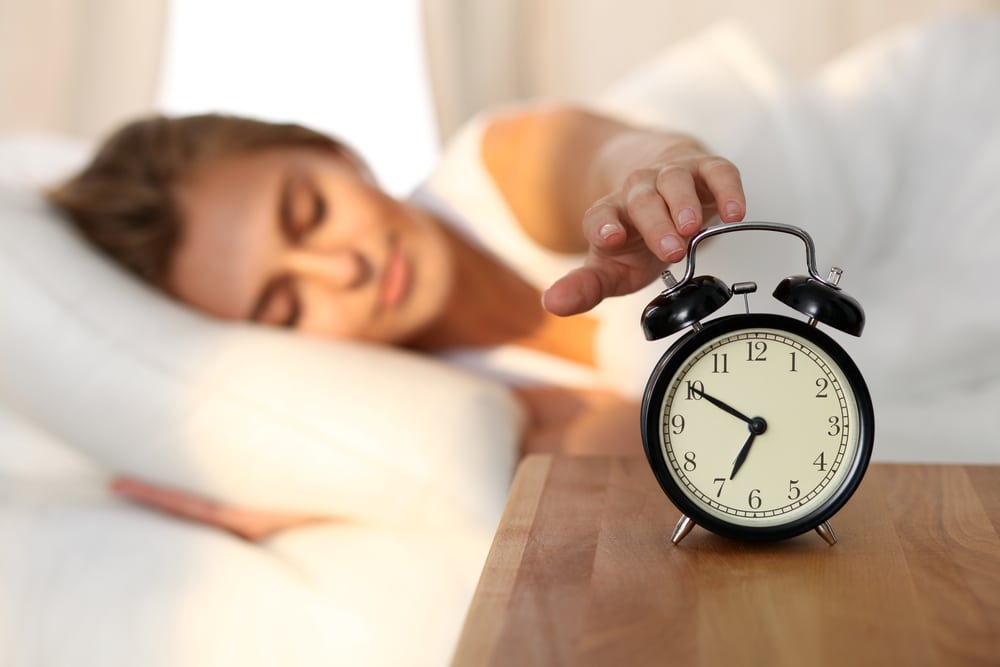Our annual change to British Summer comes this Sunday 26th March at 1 am. This change deprives us of another hour of sleep. Most of us will then wake up for work on Monday morning, tired, groggy and not quite adjusted to the new earlier bedtime. It is no surprise therefore that we won’t function properly during the day.
The problem arises because our circadian rhythm, our internal body clock, that regulates our sleep-wake timing, is designed to stay in the same cycle, give or take a few minutes, each day and night. It simply can’t easily adjust a full hour in one go. In fact, for some, it can even take days to recover.
The resulting tiredness caused when our body clocks are out of sync can have serious repercussions and the more sleep deprived we are, the worse we feel.
Another hour of lost sleep
The problem these days is that we are starting the weekend from a place of ‘sleep debt’. One recent omnibus survey of 4,000 adults by Direct Line Insurance found that;
- One in seven (14 per cent) Brits survive on dangerously low levels of sleep a night, under five hours
- Nearly three quarters (71 per cent) of UK adults do not have the recommended seven to nine hours of sleep a night
This has a significant impact on our concentration, creativity, memory and focus.
According to leading sleep researcher Matthew Walker: “Just 60 to 90 minutes of additional sleep boosts the learning capacity of the brain, significantly increasing memory retention of facts and preventing forgetting.”
The five-step plan for easing into daylight savings.
Here is my five-step ‘body clock adjustment plan’ to manage the clocks change this coming Sunday. The basics of the plan involve gradually moving your sleep schedule forward rather than losing a full hour’s sleep in a single night. Making gradual adjustments helps your body clock adapt more naturally, easing you into British Summer Time fully refreshed and ‘sleep wealthy’, rather than sleep deprived.
1. Friday Day – Set your alarm to wake up 15 minutes earlier
It might sound odd, to reduce your sleep, but if you want to go to bed at your usual time on Thursday night, this would be the best way to set up gradually adjusting your body clock. If you could start the plan by getting to sleep earlier on Thursday night it would be even better though. Either way, as soon as you wake up, get bright light into your eyes straight away by opening your curtains or blinds. This will help you quickly become fully awake and alert for the day ahead. Then get outside into the day and hopefully bright sunlight as early as possible. This helps strengthen your body clock and will also make you feel sleepy earlier than usual on Friday night. Do some exercise, preferably cardiovascular, as this is proven to improve both sleep quality and quantity. Even better, exercise outdoors to increase your daily sunlight. However, always stop exercising within 90 minutes of bed as the increase in core body temperature can make it hard to get to sleep. Aim to reduce your caffeine intake during Friday as this will help make you feel naturally sleepier in the evening too. Ideally, stop drinking caffeinated drinks at lunchtime as it takes around 10 hours to eliminate it from the body.
2. Friday Evening – Go to sleep 30 minutes earlier
Having set your alarm to start your Friday 15 minutes earlier than normal incorporate another 15 minutes of your ‘adjustment plan’ by going to bed 30 minutes earlier than normal on Friday night. This would mean if your normal sleep time were 23:00 you would be aiming to be asleep at 22:30. If you aren’t feeling tired enough to do this, try using a herb called Valerian which is proven to help us nod off. Valerian comes in either T-Bag, Tincture, or capsule form and is taken about 30-45 minutes before your planned bedtime. However, avoid alcohol within 3 hours of bedtime as this will help your sleep quality too. Whilst alcohol is a sedative and helps us get to sleep, it then leads to a broken night of poor-quality sleep.
3. Saturday Morning – Exercise Outside.
Set your alarm to wake up 1/2 hour earlier than normal. This then wakes you up in a time zone that is effectively 30 minutes earlier than the time zone you were in when you went to bed on Thursday night (Greenwich Mean Time). As a result, you have adjusted your body clock with just another 1/2 hour step to accomplish rather than the full hour that everyone else will have to adjust to when they wake up on Sunday morning. Have a good, early breakfast to help lock in the change in your digestive system. Keep to a reduced caffeine intake again so that you will naturally feel more relaxed through the day and tired in the evening. Ideally, exercise outside first thing if you can or go for a walk after breakfast.
For those wanting to create an even more locked-in plan for the day as soon as you wake up on Saturday morning change the time on your watch and clocks to British Summer Time, moving the time one hour forward. This might cause you some time-coordination problems when agreeing on plans with friends and family, but certainly, it will set you up to follow the rest of the ‘sleep clock adjustment plan’
4. Saturday Day – All your meals earlier
Along with light and temperature, food is another core influencer of our Circadian Rhythm (the body clock). In this way, if we move the timing of when we eat it can help us adjust to British Summer Time more easily. Following your earlier-than-normal breakfast, set your day out to eat your lunch 1/2 hour earlier, and ideally your dinner 45 minutes earlier than usual. Eat fermented food such as Natural Yoghurt, Kimchi, Kefir, and Sauerkraut with your meals. This helps maintain the health of your gut biome which in turn supports a better night’s sleep and more. Your gut bacteria sync their sleep in line with yours and they can be wiped out and replaced by less healthy bacteria when there are large disruptions to your body clock and sleep times.
5. Saturday Evening – Adjust your bedtime to the full hour forward
Try to have a relaxed Saturday evening. Keep your lighting dimmed or dimmed and stay off all technology. Shift your bedtime another 30 minutes earlier. This means you are now one whole hour forward and going to bed in line with British Summer Time. If you need to, use Valerian again to make yourself sleepier. In addition, you could take a warm bath with Lavender in it about 45 minutes before retiring. Alternatively use Lavender drops on your pillow if you prefer.
On Sunday morning you will now wake up refreshed as you will be in the new time zone without losing any sleep. All your mealtimes will also naturally fall into place. You won’t need to worry about whether you can manage to get to bed on time Sunday night as you will already be perfectly in sync with British Summer Time. You can therefore start your working week fully recharged, mentally alert and raring to go.
For the purposes of this blog post and the simplicity of those who work Monday to Friday, I have proposed setting up the plan to run from Friday to Sunday morning with ½ hour adjustments on Friday night and Saturday night’s sleep time. However, it would be easier on your body clock if you could do 3 x 20-minute adjustments from Thursday to Sunday, or even better 4 x 15-minute adjustments with your sleep moving forwards by 15 minutes each night on Wednesday, Thursday, Friday and Saturday night. The principles of morning light, exercise and shifting your mealtimes would still hold true and provide the platform for the ‘body clock adjustment plan’.









